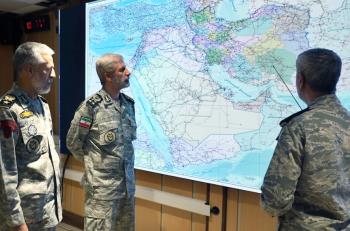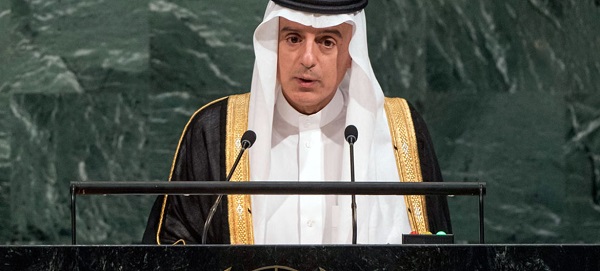Alwaght- Unlike the years before, this year’s United Nations General Assembly was not a scene for the debate to ease the international tension and address the challenges facing the global peace. Rather, it was a setting for the US President Donald Trump’s hawkish and fiery speeches that many analysts argue jeopardized the international peace and stability.
Beside the US leader, representatives of some of the US allies also made strong-toned, escalatory speeches at the UNGA. The Saudi Foreign Minister Adel al-Jubeir, for example, made his address a show for accusations and hostility against the other countries, apparently signaling engulfment of the Saudi Arabian foreign policy by radicalism.
Attacking Qatar for alleged support for terrorism
The first and perhaps the most important part of al-Jubeir speech was related to terrorism. The Saudi diplomat tried to paint the kingdom as a party engaged in a fight against terrorism. In his words, al-Jubair alluded to Qatar as the sponsor of terrorism, indirectly saying that the Qatari leaders are the key backers of terrorist groups across the region. He accused Doha of harboring “extremists” and spreading hate speech through its media.
In shedding light on his words two points can be highlighted: First, it is now obvious to all that Saudi Arabia and its leaders have been the main propagators of the extremist ideology and nurturers of radical groups around the world. Today’s claims of anti-terror by the Saudi leadership are largely ridiculous and implausible no matter how much Riyadh and its allies struggle to advertise them as a truth.
Remarks of the young Crown Prince Mohammed bin Salman of Saudi Arabia bear proof to this. Just a couple of months ago, bin Salman admitted that Saudi Arabia in the 1970s and 1980s supported fundamentalist and terrorist groups in the region against the newly-installed Islamic Republic of Iran as they observed the Iranian Islamic Revolution a threat to their rule.
Responding to the Saudi remarks, the Qatari representative said that the terrorism was nurtured by the radicalism which was itself nurtured by Saudi Arabia to serve its political objectives.
The second point is that the Saudi representative's anti-Qatari attack indicates that the inter-Arab crisis is yet to be resolved. This leads to the conclusion that the Arab NATO idea, striven for by Donald Trump and Prince Mohammed, is simply an idea with no possibility of materialization, and that the meetings to discuss it are not more than diplomatic shows.
Accusing Iran of supporting terror
Another part of al-Jubeir's speech was a gallery of the increased political hostility of Saudi Arabia towards Iran. He supported the US anti-Iranian agenda, saying that the kingdom was in favor of the new strategy of Washington against Tehran nuclear program, missile developments, and the deepening toehold in the region.
He claimed that the Iran's behavior in the region was contrary to all of the international agreements and the UN Security Council’s resolutions and it stood as a strong drive for the US to reinstate the economic ban on Tehran.
In the Saudi FM's UNGA speech on Iran, three points need to be accentuated: First, he exposed the antipathy to Iran through support to Trump’s restrictive measures. Second, his remarks exhibit that Iran’s missile power is becoming a serious obsession for the Saudi rulers. And third, he addressed Iran from the window of the international law and resolutions to which the Arab monarchy shows no respect. These three issues can prove one thing: Saudi Arabia lacks the clout to directly counter Iran and seeks to put Trump and the international community face-to-face with Tehran.
The FM closes his eyes to the apparent support of Riyadh to the terrorist factions and destabilization of regional order in an effort to channel the global attention to Iran. But the world knows who is funding ideological fundamentalism and exports it worldwide.
Iran’s Foreign Ministry Spokesman Bahram Qassemi, reacting to al-Jubeir's tension-causing words on the Islamic Republic, said: “The origin of the terrorism which today encompasses the world and particularly the Middle East is nowhere but Saudi Arabia and the radical thought propagated and funded by this (Saudi) regime.”
Favoring a political solution in Yemen
Al-Jubair also talked about the Yemen war and highlighted the political solution as the best choice. Addressing the Council on Foreign Relations in New York on Wednesday, al-Jubeir said the main aim of the war waged on Yemen is to counter the threat of “militias” on the kingdom, in reference to the Ansarullah movement as the key Yemeni party opposing Saudi intervention. He continued that Riyadh was committed to a political settlement pursuant to the Arab initiative and the UNSC resolution 2216.
He admitted that Ansarullah “has every right to be part of Yemen's political system” but rejected to see it form a military force out of the frame of the official armed forces. He said once the war is over, Saudi Arabia will fight unemployment, restore medical services, and recover the education system in Yemen.
These remarks are hard to believe with a looking back at its record in Yemen in the years of war. The Foreign Policy website revealed that since the beginning of the war, Riyadh spent about $500 billion on the bombs and attacks on Yemen or funding the anti-Ansarullah militias. The rights groups warn that atrocities against the civilians have led to the world’s largest humanitarian crisis.
Riyadh’s shift on Palestine
Al-Jubair also had his say on the Palestinian cause, saying Saudi Arabia sought a Palestinian state with Eastern Al-Quds (Jerusalem) as its capital and that the Israelis should stop the desecrating and spatiotemporally dividing of the holy Al-Aqsa Mosque. The remarks signaled a retreat from the previously-held stance.
Over the past months, Prince Mohammed-dominated Saudi foreign policy played into the hands of the Israelis and Trump’s “deal of the century” which is yet to be revealed but it appears to strip the Palestinians of Al-Quds, their seized lands, and the right to return.
But the Palestinian and Muslim nations’ pressures forced the Saudis to review their policy, at least to save what remains of their credit among the Muslim and Arab states, though these stances are hardly solid and bear no bargaining power as it seems highly likely for bin Salman to agree behind the scenes with Trump and the Israeli Prime Minister Benjamin Netanyahu on the deal of the century.



























